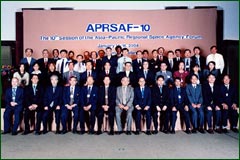 |

 Over the last two years, I have acted as a cochairman for the space education/awareness session at the Asia-Pacific Regional Space Agency Forum, for which JAXA is a secretariat, and we gathered the following information. Countries in Asia vary in their level of interest in a commitment to space education. The major aspect of the commitment of Asian countries is that many of their educational programs focus on remote sensing for floods and precipitation that are closely related to their daily lives. Their urgent need is to educate technicians to be able to analyze satellite data, and they cannot afford to consider educational programs for children. Japan can help them to provide training for remote sensing which is already advanced in Japan. Over the last two years, I have acted as a cochairman for the space education/awareness session at the Asia-Pacific Regional Space Agency Forum, for which JAXA is a secretariat, and we gathered the following information. Countries in Asia vary in their level of interest in a commitment to space education. The major aspect of the commitment of Asian countries is that many of their educational programs focus on remote sensing for floods and precipitation that are closely related to their daily lives. Their urgent need is to educate technicians to be able to analyze satellite data, and they cannot afford to consider educational programs for children. Japan can help them to provide training for remote sensing which is already advanced in Japan.
In India, where the percentage of the space development budget of GDP is higher than that of Japan, many programs for children are carried out through the national budget. Japan can learn many things from Indian space education activities such as a yearly 9-month intensive program for students with Masters' degrees in Asian countries. The vision of Dr. Sarabhai, a researcher, entrepreneur, and politician, has been continuously handed down to the next generation. The current president of India, Dr. Kalam, is also a space researcher.
The National Space Agency of Malaysia, which was just recently established, has placed the important role of education under the first director and scientist, Dr. Othman.
Photo
The 10th Asia-Pacific Regional Space Agency Forum held in Chiang Mai, Thailand (between January 14 and 16, 2004)
|
 |
5/6 |
 |
|
 |